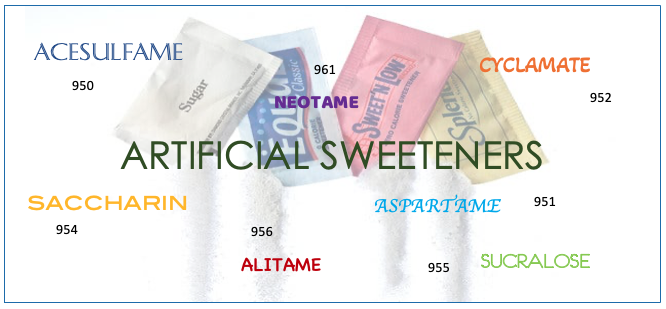Today’s post is about artificial sweeteners.
Alternative sweeteners have had a significant rise in popularity in the past year or 2.
This got me thinking about the different myths that are in circulation about sugar alternatives. There are several and we have all heard of 1 or 2.
Unfortunately, some are driven by marketing companies trying to sell a particular product.
Others started when our grandparents were children and more scientific research had not yet been conducted.
The myth I am going to focus on today is – artificial sweeteners are better for weight loss.
There are so many products on the market that contain artificial sweeteners. The ever-growing use of these products is due to the sweeteners having little or no calories compared to other sugars.
The problem is, no one talks about the side effects of these chemicals. 1 of the sites I used to research this topic listed 7 different artificial sweeteners, many I had not heard of.
I have chosen to focus on 2 that are widely available and known to most people.
First – Aspartame
The discovery of this artificial sweetener in 1965, made it possible to replace sugar with a less caloric product. Mostly listed on ingredient labels as 951, aspartame is up to 200 times sweeter than sugar.
2 widely used, commercially produced forms of aspartame are Equal® or Nutra-Sweet®.
The soft drink industry is quick to point out that the aspartame is a very minor amount that causes no harm in the body. However, that minor amount soon magnifies when you consider the average quantities consumed today. For instance, 1 litre of diet soft drink is an average daily intake for millions of people.
Safety studies have found the metabolism byproducts of aspartame (aspartic acid, phenylalanine, and methanol) to be more harmful to the body than the original substance itself.
For instance, Methanol is first converted in the liver to formaldehyde. While methanol is known to damage the liver, formaldehyde is known to be responsible for the destruction of liver cells.
Methanol found naturally in foods is always accompanied by other compounds which counteracts the dangerous effects of methanol. Aspartame does not contain these.
The recommended maximum intake of methanol is 7.8 mg. per day. However, 1 litre of soft drink containing aspartame actually contains 56 mg. of methanol.
A medical article published in 2021 highlighted that Aspartame consumption can cause mood disorders, mental stress, and depression. Other studies have also found that absorption of aspartame during pregnancy correlates with autism in children.
Second is – Sucralose, also listed as 955
A compound that was originally under consideration as an insecticide became Sucralose. It was invented by accident in 1975 when a laboratory leader at Queen Elizabeth College, London, told an assistant to “test” the chemical, but the assistant misunderstood; he thought that he needed to “taste” it. After discovering the sweet taste of the compound, the team continued with its scientific work. The research team filed for a patent for ‘Sucralose’ in 1976, and received it in 1984.
The artificial sweetener Splenda®, is a sucralose. It is 600 times sweeter than table sugar; although this can vary from 300 to 1,000 times sweeter, depending on the food application.
This product is advertised as “made from sugar”. It is, via a complicated process that involves five steps that chemically change the structure of the sugar molecule, making it a chlorocarbon.
Chlorocarbons have long been known to cause damage to organs and the reproductive system, which, in turn, causes genetic defects.
The manufacturer has assured the public that sucralose passes through the body unabsorbed. However, it seems that this is not correct. According to Japanese researcher’s, sucralose is absorbed and metabolised into the body by as much as 40%, In particular, the absorbed sucralose has been found to concentrate in the liver, kidneys, and gastrointestinal tract.
Studies of sucralose have shown it actually affects a part of the brain, confusing it, making the brain think it needs more calories. This actually translates to an increase in the consumption of calories and therefore an increase in weight.
With this information so readily available, it still amazes me that people will continue to consume products containing these chemicals.
If you’re considering artificial sweeteners to lose weight, try replacing sugary foods and drinks with unsweetened substitutes and slowly cut down on the amount of sugar you use.
I think I will look at other sugar alternatives in some future posts.
Till the next post,
Live clean n prosper
Sources – www.innvista.com – National Library of Medicine – Environmental Health Journals –

